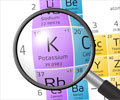- Potassium - (http://lpi.oregonstate.edu/infocenter/minerals/potassium/index.html#rda)
- How Potassium Can Help Control High Blood Pressure - (http://www.heart.org/HEARTORG/Conditions/HighBloodPressure/PreventionTreatmentofHighBloodPressure/Potassium-and-High-Blood-Pressure_UCM_303243_Article.jsp)
- Potassium and Your CKD Diet - (http://www.kidney.org/atoz/content/potassium.cfm)
- Role of potassium in regulating blood flow and blood pressure - (http://www.ncbi.nlm.nih.gov/pubmed/16467502)
- A prospective study of dietary calcium and other nutrients and the risk of symptomatic kidney stones - (http://www.ncbi.nlm.nih.gov/pubmed/8441427?dopt=Abstract)
What is Potassium?
Potassium is a dietary mineral and electrolyte that is obtained from the food we eat.
Our normal body functions depend very much on the optimum levels of potassium inside and outside cells. Potassium also helps to maintain the pH levels in your body.
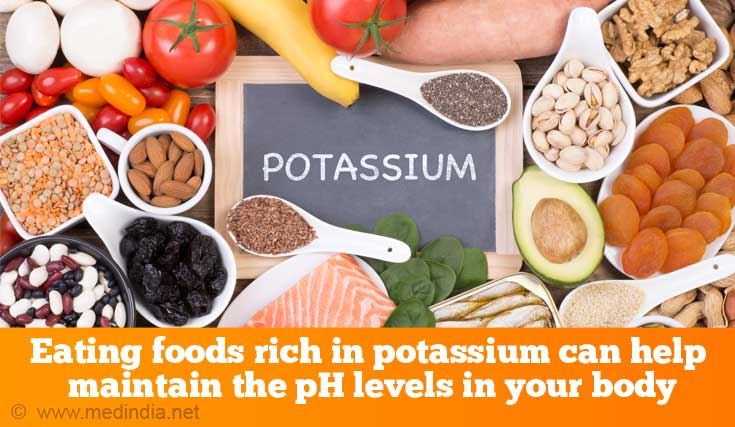
It is necessary to maintain potassium-sodium balance in the body. This is because there is a constant movement of these electrolytes across the cell membrane and this process involves the hydrolysis of ATP (adenosine triphosphate) to provide necessary energy and nerve cell function, and is responsible for maintaining the excess of sodium ions outside the cell and excess of potassium ions on the inside. Thus, potassium acts from inside the cells and the sodium acts from outside the cell. So, for the cell to be in balance and function normally, both potassium and sodium must be in balance. A diet of processed foods can easily cause sodium-potassium imbalance, since such foods contain too much sodium and too little potassium.
A study from the Centers for Disease Control and Prevention published in the Archives of Internal Medicine, July 2011 issue reported that ‘people who eat a lot of table salt and very little potassium were more than twice as likely to die from a heart attack as those who ate about equal amounts of both nutrients’.
The Recommended Daily Allowance (RDA) for Potassium is 4,700mg for both men and women.
Functions of Potassium
- Potassium regulates your heartbeat by triggering your heart to squeeze blood through your body. If you experience irregular heart beats, known as arrhythmias, your potassium levels may be low
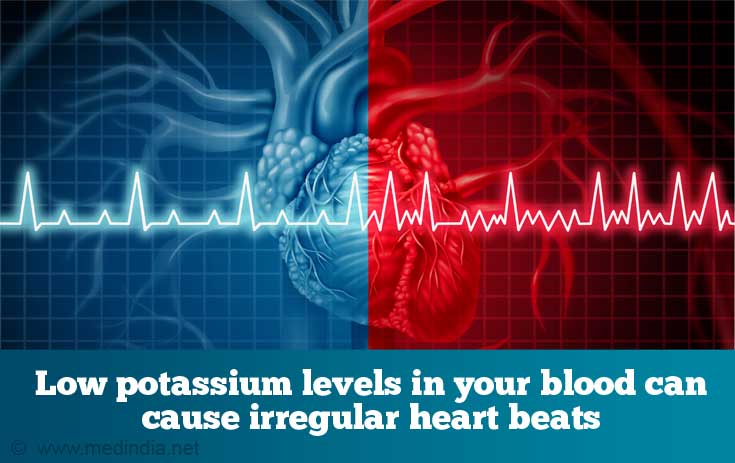
- Potassium also controls muscle functioning
- It is the mineral that directs the transfer of nutrients through the cell membranes, a function that decreases with aging accounting for the circulatory damage, lethargy and weakness of old people.
Potassium Deficiency
Chronic low potassium levels have been associated with a variety of lung disorders, kidney disease, and hypertension in both adults and children.
Signs and Symptoms of Potassium Deficiency
- Abnormally dry skin, acne
- Chills, insomnia
- Cognitive impairment, depression, diminished reflexes, nervousness
- Constipation, diarrhea
- Edema
- Excessive thirst
- Glucose intolerance, hypoglycemia, high cholesterol levels, low blood pressure muscular fatigue, muscle cramps, headaches
- Growth impairment
- Salt retention and hypersensitivity to salt
- Respiratory distress
- Hormone fluctuation
High potassium content is found mainly in fruits and vegetables.
High-pottasium Foods
| Fruits | Vegetables | Other Foods |
| Apricot, raw (2 medium) dried (5 halves) | Acorn Squash | Bran/Bran products |
| Avocado (¼ whole) | Artichoke | Chocolate (1.5-2 ounces) |
| Banana (½ whole) | Bamboo Shoots | Granola |
| Cantaloupe | Baked Beans | Milk, all types (1 cup) |
| Dates (5 whole) | Butternut Squash | Molasses (1 Tablespoon) |
| Dried fruits | Refried Beans | Nutritional Supplements: Use only under the direction of your doctor or dietitian. |
| Figs, dried | Beets, fresh then boiled | |
| Grapefruit Juice | Black Beans | |
| Honeydew | Broccoli, cooked | Nuts and Seeds (1 ounce) |
| Kiwi (1 medium) | Brussels Sprouts | Peanut Butter (2 tbs.) |
| Mango (1 medium) | Chinese Cabbage | Salt Substitutes/Lite Salt |
| Nectarine (1 medium) | Carrots, raw | Salt Free Broth |
| Orange (1 medium) | Dried Beans and Peas | Yogurt |
| Orange Juice | Greens, except Kale | Snuff/Chewing Tobacco |
| Papaya (½ whole) | Hubbard Squash | |
| Pomegranate (1 whole) | Kohlrabi | |
| Pomegranate Juice | Lentils | |
| Prunes | Legumes | |
| Prune Juice | White Mushrooms, cooked (½ cup) | |
| Raisins | Okra | |
| Parsnips | ||
| Potatoes, white and sweet | ||
| Pumpkin | ||
| Rutabagas | | |
| Spinach, cooked | ||
| Tomatoes/Tomato products | ||
| Vegetable Juices |
In general, the following foods are very rich in potassium.
1. Dry Fruits- Dry fruits most probably contain the highest amount of potassium. For example, a cup of dried apricots and prunes contain 1.5g (43% Daily Value) and 1.4g (40% of daily recommended value) of potassium.
2. Dates- 100g of dates will give you 680mg of potassium amounting to 19 percent of the daily recommended value.
3. Coconut Water- Coconut is a good source of potassium, especially dry coconut and coconut water. There is 600 mg in one cup of coconut water, which is 17 percent of the daily value.
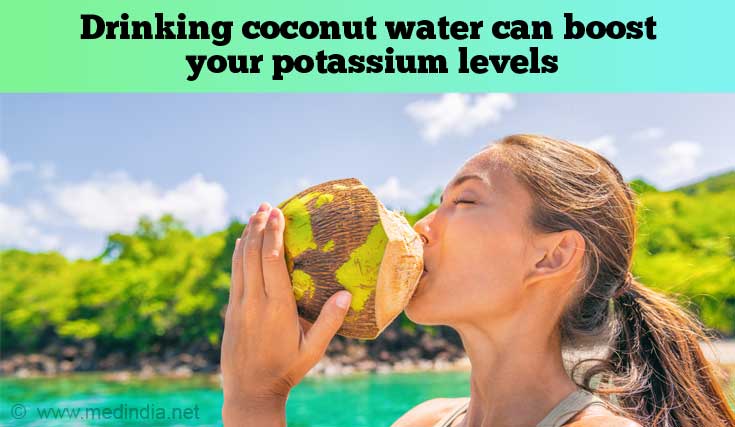
4. Baked Potato- Baked potato contains 1081mg of potassium per potato. However, the potato has high levels of starchy carbohydrate which can increase your insulin and leptin resistance. However, sweet potato is one of the richest sources of potassium and is highly recommended by experts to control various diseases. One baked medium sweet potato, with skin contains 450mg of potassium as well as other important minerals and vitamins.
5. Banana- Although believed otherwise, banana is not the richest source of potassium. A medium-sized banana provides 422mg of potassium equivalent to 12 percent of daily allowance.
6. Mushrooms- A cup of sliced mushroom also provides 12 percent of the recommended daily value of potassium. Other mushrooms such as Portabella (9% DV), Crimini (9% DV), Shiitake (5% DV), and Maitake (4% DV) also provide a good amount of potassium. The plus point is a cup of cooked mushrooms contain only 28 calories, unlike potato or coconut.
7. Beans- White beans, kidney beans, lima beans and others are rich in potassium. A cup of cooked white beans provides 1004mg of potassium amounting to 29 percent of daily value. Other beans too range from 10 to 28 percent of recommended daily allowance.
8. Dark Leafy Greens- Leafy greens such as spinach and Swiss chard are a great store of potassium. For example, a cup of cooked spinach provides 839mg of potassium or 24 percent DV.
9. Yogurt- Yogurt is also high in potassium. 100g of yogurt contains 255mg of potassium and meets 7 percent of the daily requirement.
10. Fish- Although fruits and vegetables are the main sources of potassium, fish such as salmon, halibut, tuna and anchovies are also great potassium sources. A 3-ounce fillet of salmon and halibut provides 15 percent DV and 13 percent DV of potassium respectively.
An imbalance in the potassium to sodium ratio in your diet can lead to hypertension (high blood pressure) and other diseases including kidney stones, rheumatoid arthritis and even stomach cancer.
Potassium Rich Foods for High Blood Pressure
A diet rich in potassium is important to control blood pressure because potassium reduces the effects of sodium, which is considered to be the main culprit in causing high blood pressure. The American Heart Association recommends the DASH eating plan since their study found ‘that a diet rich in fruits, vegetables, fat-free or low-fat (1 percent) milk and milk products, whole grain foods, fish, poultry, beans, seeds and unsalted nuts reduced systolic and diastolic blood pressure by 5.5/3.0 mm Hg compared to what the average American eats’.
Dietary supplementation of potassium can lower blood pressure in normal and some hypertensive patients. Although the effects are visible later than in case of table salt restriction, taking approximately 4 weeks, such supplementation reduces the need for antihypertensive medication. Supplementation with potassium increases the urinary excretion of sodium chloride, according to Physiology and Biomedical Engineering researchers at Mayo Clinic. ‘Potassium supplementation may even reduce organ system complications such as stroke,’ they add.
Potassium Rich Foods During Pregnancy
During pregnancy and lactation the need not only for the energy intake increases but also for some mineral elements including potassium. This is because your blood volume expands by up to 50 percent during pregnancy, so you'll require more electrolytes to keep the extra fluid in the right balance. Pregnant women require 4700mg of potassium per day, while nursing mothers will require 5100 mg per day.
Potassium Rich Foods for Osteoporosis
Bone mineral density is positively associated with potassium intake. Potassium-rich foods help buffer acids in the body because they contain bicarbonate ions. When the quantity of bicarbonate ion intake is insufficient to maintain normal pH, your body will mobilize alkalinizing minerals from bone to neutralize acids consumed in the diet and generated by metabolism, thereby reducing the bone mineral density. This will consequently lead to osteoporosis. Potassium-rich foods help reduce the net acid content of the diet and preserve calcium and other minerals in the bones.
Potassium Foods for Kidney Stones
Abnormally high urinary calcium increases your chances of developing kidney stones. Increasing dietary potassium intake by increasing fruit and vegetable intake can decrease urinary calcium excretion. For example, a study of 45,619 men, 40 to 75 years of age who had no history of kidney stones, found that those who averaged more than 4042 mg/day of potassium were only half as likely to develop symptomatic kidney stones as men whose intake averaged less than 2895 mg/day. The study was published in the New England Journal of Medicine.
However, too much potassium can be harmful in many older persons and those with kidney disorders.
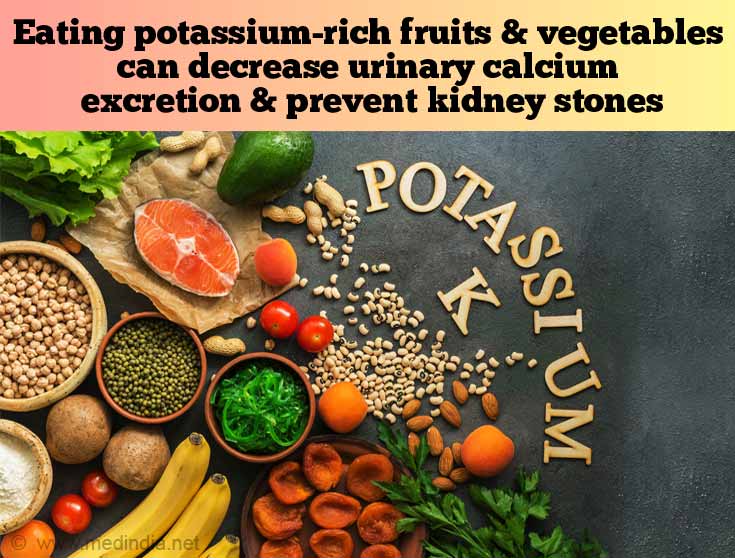
Potassium Rich Foods for Diabetics
If you have diabetes, you should check with your doctor before increasing the amount of potassium in your diet. Just as in the case of kidney disorders, eating more potassium-rich foods may not be helpful for diabetics. However, diabetic ketoacidosis is a serious complication of diabetes that occurs when your body produces high levels of ketones (type of acids). It develops when your body is unable to produce enough insulin. The fluids and insulin used to treat diabetic ketoacidosis may cause your potassium level to drop too low. That is when you require to consume more potassium-rich foods.






